Fee to fish?: Group sets public meetings to break down report on noncommercial fishing regulation
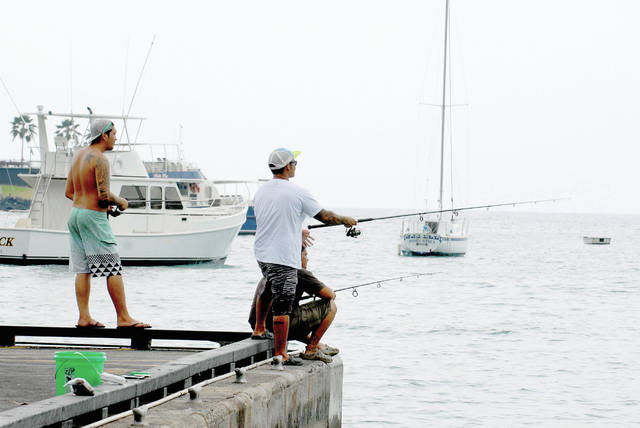
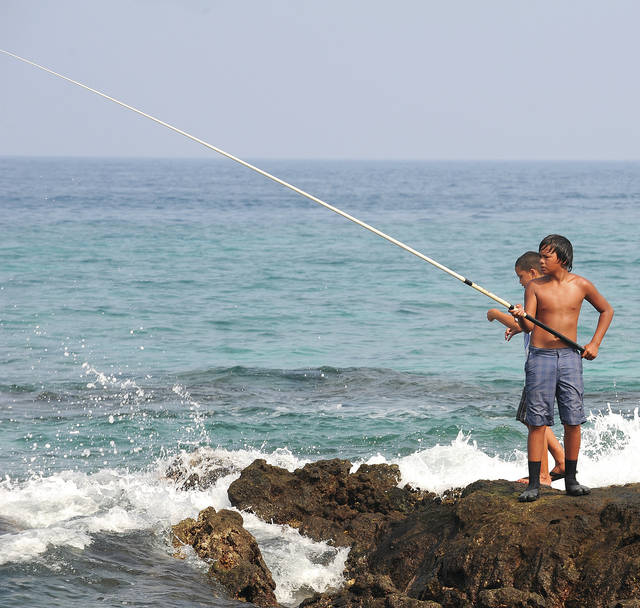
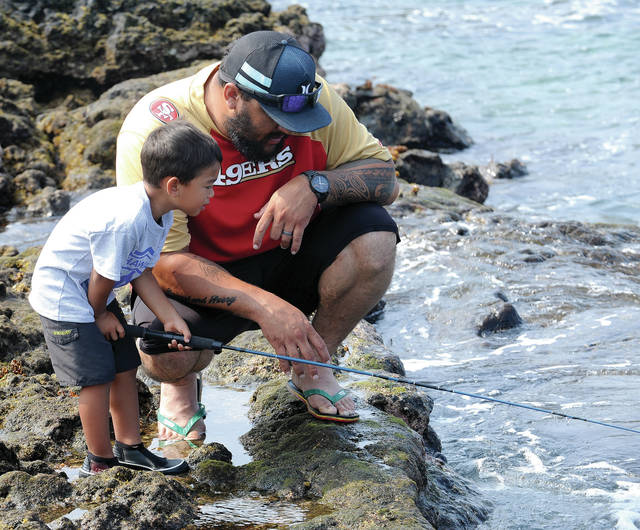
Kaina Lee watches his son Chevy fish in Milolii. (Laura Ruminski/West Hawaii Today file photo)
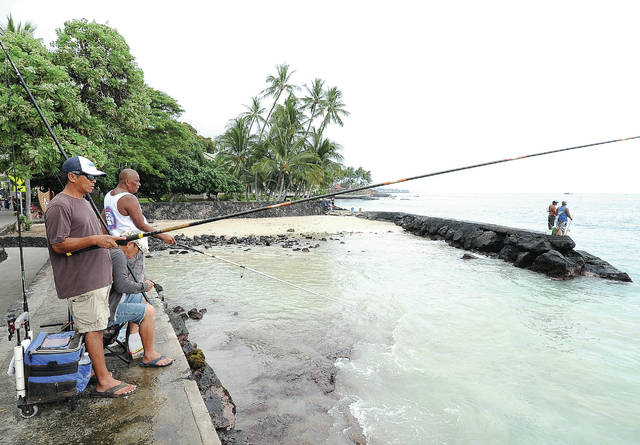
Fishermen try to catch fish off the seawall on Alii Drive. (Laura Ruminski/West Hawaii Today file photo)
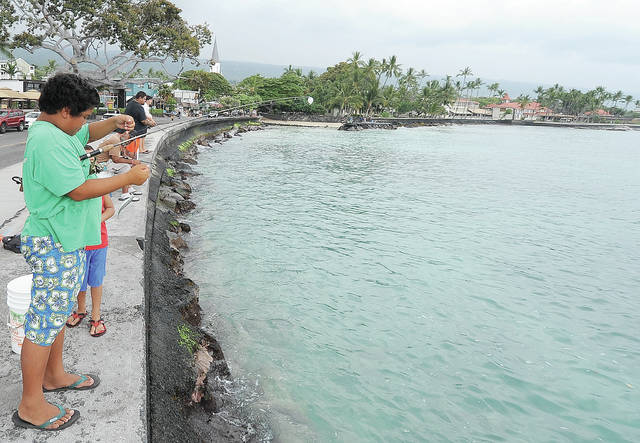
KAILUA-KONA — Almost two years after Conservation International Hawaii and the Western Pacific Fishery Council released a feasibility study on a regulatory system for noncommercial fishing in Hawaii, contributors are touring the state to discuss it with the public.
KAILUA-KONA — Almost two years after Conservation International Hawaii and the Western Pacific Fishery Council released a feasibility study on a regulatory system for noncommercial fishing in Hawaii, contributors are touring the state to discuss it with the public.
Aarin Gross, senior program manager for policy and operations with Conservation International Hawaii, said the time lag resulted because report details didn’t circulate on their own as effectively as the group had expected.
“The people we had hoped would gain access to this information probably didn’t have access to it,” she said.
Public meetings meant to break down the controversial issue of a regulatory system for recreational fishing in Hawaii, which will carry with it annual fees for local fishermen, are set for both Kailua-Kona and Hilo.
Presenters scheduled the first from 5-8 p.m. Tuesday at the Natural Energy Laboratory of Hawaii Authority Gateway Center in Kailua-Kona. The meeting in Hilo is 5-8 p.m. Wednesday at the Mokupapapa Discovery Center.
Meetings are also being convened on Oahu, Maui, Kauai, Molokai and Lanai.
The report “took no collective position” as to whether the state should implement a mandatory noncommercial fishing registry, permit or license (RPL) system.
However, it did note “that there are no legal or constitutional barriers in Hawaii that would prohibit the implementation of a new RPL system,” adding it’s possible to design one without violating Native Hawaiian gathering rights protected under state law.
Gathering info
Conservation International Hawaii program director Matt Ramsey wants to make one thing clear to those planning to attend — that his organization isn’t lobbying on behalf of either side of the issue.
For the study group, it’s all about the information.
“This meeting is not part of the rulemaking process,” Ramsey said. “I think a large misconception out there is that this is somehow related to state regulation or a legislative effort, and that’s definitely not the case. While those two things may happen on their own, we are not involved in that at all.”
It’s also all about the information for Brian Neilson, acting administrator of the Department of Land and Natural Resources Division of Aquatic Resources.
Neilson, his agency and its parent agency would all be directly involved in any implementation of an RPL system in Hawaii, which he said they’re “very interested in.”
Community feedback generated in the meetings will inform and mold a push specifically for a licensing system option, possibly as early as this year, he added.
Legislation
However, DAR/DLNR can’t implement a licensing system of its own accord. It requires statutory authority by way of the state Legislature.
House Rep. Nicole Lowen, D-North Kona, said multiple bills have been introduced to address noncommercial fishing regulation during her six years in office, including proposals to study the matter or levying fees only on nonresident fishermen.
For a licensing system that also charges residents a fee, Lowen said there’s really only one feasible legislative path.
“If the administration is not on board with it, it would probably be dead in the water,” said Lowen, meaning any bill with a chance to cross the finish line would have to come from relevant agencies with Gov. David Ige’s backing rather than from a state legislator.
“When DAR and DLNR are ready to spearhead it as something that needs to happen in the state, then I think we could start the work of getting legislators on board,” she added. “Because obviously, it will be controversial.”
Neilson said that might happen as early as January.
“We are thinking about the possibility of introducing legislation in this upcoming session,” he said, “but we’re still getting feedback.”
If legislation passed, details would be ironed out through the administrative rulemaking process, which would allow multiple opportunities for public input.
Strong opinions
Hawaii is currently the only state without noncommercial fishing regulation in any form.
Local fishermen, particularly those of Native Hawaiian descent, have fished island waters all their lives. Many see the practice as not just a right and/or a necessity, but as an integral part of their culture.
“I recreationally fish, but it’s to put food on the table,” said Billy Lum, 61, who’s been casting lines on three different islands for the last half-century. “I know a lot of Hawaiians are going to be totally against anything like that because we’re so used to being able to go out and provide food for the family, so now having to buy a license for it …”
Many fishery managers, however, say the benefits outweigh what would be a minimal cost to fishermen. Creating a licensing system allows the state to build a database and gather a sense of how many people are fishing recreationally, information it currently doesn’t have. It also provides an avenue to circulate information about catch limits and size limitations to fishermen.
All this, Neilson said, will maintain a rich fishing environment in Hawaii for generations to come, and at what he believes is likely to be a reasonable cost. While no figure has been decided on, Neilson said the annual price now in mind for a license is $5 and would come with fee waiver exceptions for children, the elderly, veterans and the financially disadvantaged.
“We don’t want this to be a hardship on our Hawaii residents,” he said. “The cost could be significantly higher for nonresidents.”
Freshwater licenses currently run $5 each, while DAR bumped commercial fishing licenses from $50 to $100 annually within the last year.
Lum explained most recreational fishermen, particularly those of Hawaiian heritage, will have less of a problem with forking over a $5 bill than with what the payment symbolizes. He understands the benefits Neilson laid out and could see himself supporting a reasonably priced licensing system, but he’d also want to know where the money would go.
Neilson said the aim of the fees would be to set up and manage an online licensing system, which would allow residents and nonresidents to acquire licenses immediately so as not to hurt local fishing tour operators. Physical locations like tackle shops interested in participating may also be set up.
While the statewide meetings on the matter are sure to be full of strong opinions, Lum pointed out that it may not matter much whether a licensing system is ever introduced in Hawaii.
“In all the years I’ve been fishing, I’ve never ever seen any kind of enforcement as far as fishing regulations,” Lum said. “I know there’s plenty of fishermen out there who don’t give a rip.”



Another bunch of environmentalist wackos thinking they know better than you. Conservative International. They put Hawaii in the name then tells us there not that interested, just gathering information. $5.00 will not even cover the cost of paperwork and extra help w/ benefits/retirement. All the reason for doing this that I’m reading here is big time lame. Why fix it if it ain’t broke and why do something the other 49 states do. It’s a very bad idea that can only get worse.
Hawaiians have hunted forever and there is a hunting license.
How about working on providing more income for the residents prior to extracting more money from us? Once again putting the cart before the horse. Or in this case Kim’s family before the very people he is supposed to represent!
So lets see if I am tracking this correctly..
1) The DLNR changes their rules to allow them to pillage the local populous with new fees and rents. (When you see Diamond Parking thank DLNR, when you see new fences on a hike that you used to do thank DLNR)
2) They evict the people who created the harbor (Gentries etc..)
3) They create new fee and rent agreements in many cases doubling the fees and rents (Atlantis).
4) Now they are going after our fish saying that it is only $5 (This will soon turn into $50)
The worst part of all this is they are using our current tax dollars to extort us!
California here we come!
If we’re going to come up with new things to license, let’s start with one for proposing new government programs, paperwork, or fees. Line 1 on the license application can be for listing what actual and realistic public benefit, if any, the applicant can suggest with a straight face.
Let’s see so far this year. Harry $kim has raised PROPERTY TAX the GAS TAX the FOOD TAX the EVERTHING YOU BUY TAX. Gave all his FRIENDS 30 to 40 thousand dollar raises. Why isn’t there ANARCHY in the streets. In France they raised the gas tax and there were a hundred thousand people in the streets demanding they lower it. seems the people of Hawaii are hopeless from all the abuse we take from out ELECTED. Stand up and shout already.
Legislation equals more control.
It is all about empowering enforcement, nothing else. Ticketing is where the money is generated.
Not sure why Hawaii votes for Democrats, especially Big Island???
Maybe go back to the old style where if you broke the fishing kapu you got your head smashed between two rocks.
Maybe create a new system where the people who over tax and over regulate us commoners are banished in the name of freedom.
You bring up the hunting licence in Hawaii which is $10 for residents and $95 for non residence. I would bet that even with these high fees this system does not create any meaningful benefit and is not self sustaining with its fees. In other words it is just another burden with no benefit.
One more thing, these guys are environmental activists interested in increasing their power and control. Here is a quote “Conservation International Hawaii program director Matt Ramsey wants to make one thing clear to those planning to attend — that his organization isn’t lobbying on behalf of either side of the issue.” – This is an outright lie, these guys clearly have an agenda just look at their history!
Maybe I am mistaken but I would expect most fishers would be in favor of conserving our fish populations so there are still fish around for our children and grandchildren. I don’t see that as an evil agenda.
You are correct we are interested in protecting our fish but also our freedom on the water. The trouble is that a recreational licence will only hinder our freedom and provide no benefit to us or the fish population.
If you are truly interested in protecting our fish research how commercial fishing and the long line industry works and the corruption in the Hawaii DLNR. Take a look at how foreign fisherman are used and the DLNR facilitates this. Just search “hawaii foreign fisherman” you will see there are 700 fisherman paid cents an hour to take tens of million pounds of fish from Hawaii.What do you think that does to our fish population?
the problem with the fishing is hawaii is that boats with foreign crews are taking all the big fish further out way before they get to the islands … it has zero to do with locals gathering sustenance. as usual the proposals miss the mark and just life for locals harder
Exactly right. Their long line quota is almost eight million pounds of just Big Eye tuna, and because the cost of using foreign fisherman is so low it nets the local economy just a few dollars a pound. In addition to the eight million pounds extracted sometimes the quota’s from Guam and other areas in the pacific are allowed to be extracted from our waters as well. This is an absolute travesty.
There is big time corruption as well. One family owns the fish distribution network in Oahu so the lower the price at the doc the better their profits on the other end (that is the reason for foreign fisherman). DLNR is in on the corruption so they look the other way.
DLNR, the Department of Land and No Recreation. More enforcement coming our way.
Last thing in the world we need…. is the DLNR getting involved in local fishing!
I cant think of a worse thing to happen in Hawaii
Try living in a State that is DLNR regulated, like they want to make it here, nobody will have anything good to say about it, except the people that do not utilize the outdoors.
We DO live in a state that is DLNR regulated. Those ‘tards carry guns and will use them given half a chance.
Check out the honolulu star advertisoe front page 11-20 where DLNR did not charge boaters and owners of buildings for years on state land now they are trying to tax shoreline substinence fishing to make upfor it instead…
Please don’t let this happen Hawaii. Here is a peek into what the State of Washington is currently doing…. Non-residents aged 16 to 69 will pay higher fees. Freshwater only is $84.50 and saltwater only is $59.75. A shellfish/seaweed gathering license is $36.10 but a razor clam specific license is $21.80. Fishing and gathering shellfish combined costs $124.65 a year. Add on another $14.80 if you’d like to use two poles.
Just another way to mismanage the state. DLNR couldn’t make out in a whore house with a pocket full of $100 bills. More examples of light rail, water department,power company, and transit. When are the people going to wake up and vote out the good old boys?
There is NO license proposal on the table at this time that the study group is aware of. While DAR may be working on a proposal, the study group has not seen any proposal from DAR or any other entity. These meetings are an effort to educate the public, specifically the fishing communities, on understanding the concepts of fishing registries, permits and licenses, so that everyone can think about their pros and cons.